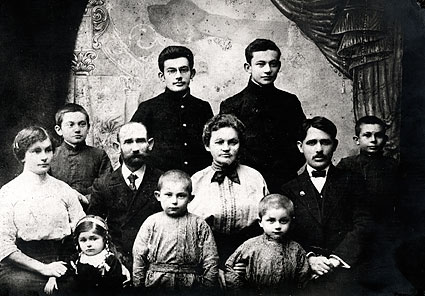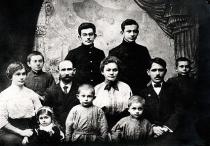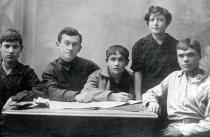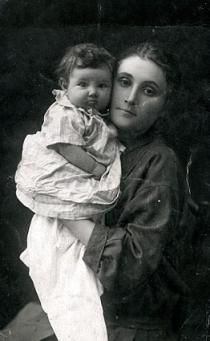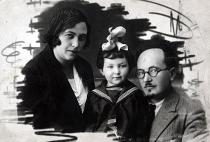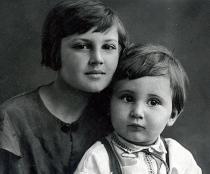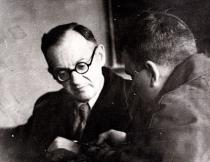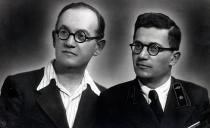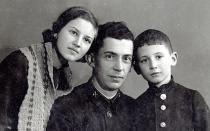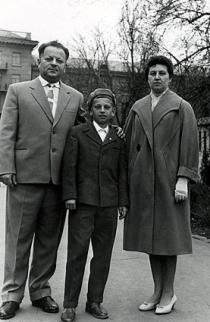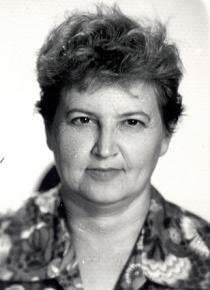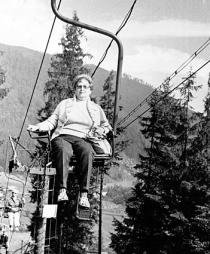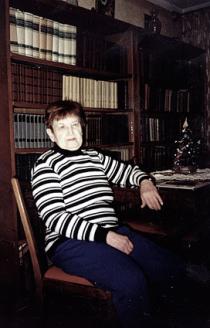This is my father's family. Standing in the foreground from left to right: daughter of my father's sister Rosalia Ethilia Belotserkovskaya, my father's brothers David and Anatoli Kogan. Sitting, from left to right: my father's sister Rosalia Belotserkovskaya, my grandfather Mordko Kogan, my grandmother Chaya Kogan, my father sister Rosalia's husband Yuli Belotserkovski. Standing in the 2nd row, from left to right: my father Moisey Kogan, my father's brothers Lev, Grisha and Yakov Kogans. This photo was taken in Novomirgorod in 1916.
My father's father Mordko Kogan was born in Boguslav, Kanev district, Kiev province [according to census of 1897 - 11,372 residents, among them 7,445 were Jews] in 1865. He lost his mother when he was small and was raised by his stepmother. He studied in cheder. Grandfather Mordko was a distant relative of Sholem Aleichem. He liked him and often read his works in Yiddish aloud. My grandmother Chaya and grandfather Mordko got married in 1882 and settled down in the house of grandmother parents' home in Novomirgorod. There were three rooms in the house. There was a kitchen and a toilet in the yard. My father told me that grandfather was small and thin, had brown hair, red beard and blue eyes. The Jewish community respected my grandfather Mordko and he was a permanent member of arbitrary court [the court is elected by conflicting parties, senior rabbi in the town usually was head of arbitration: ab-bet-din] that resolved the majority of conflicts between Jews. My grandfather went to the synagogue on holidays. He wore yarmulka at home. He was a religious man. Several times his wealthier relatives loaned money to him to start some business of his own, but he failed every time he started something. My grandfather was a shop assistant in a fabric store. He got up before dawn in the morning, boiled water in the samovar and sat down to have tea biting on a lump of sugar. He usually had 5-6 glasses of tea, wrapped his breakfast in a newspaper sheet and went to work. He had dinner after he returned from work in the evening. Grandfather Mordko didn't earn much. The family lived modest life, but grandfather Mordko didn't care much as long as his good name was preserved. After the February revolution that grandfather welcomed he began to work in a cooperative.
In spring 1919 the most dramatic Jewish pogrom in Novomirgorod took place. My father's neighbors, the Christian family of Berest who was a shop assistant in my father's shop, offered shelter to my grandfather's family. On the night of 19 May grandmother and my father's younger brothers David and Anatoli hid in Mr. Berest's house and grandfather with Grisha, my father and Yakov hid in their hayloft. Grandfather Mordko decided to try to get home to see what was happening there despite his son's requests to stay. There was a group of bandits in the yard of his house. My grandfather ran to the river across the garden, but a bullet reached him. He was wounded, but he managed to sail across the river and hide in the stables at a farm. The owner ordered his laborers to throw him out into the street where my grandfather died. He was buried together with other victims of this pogrom in the Jewish cemetery in Novomirgorod.
My grandmother Chaya-Leya Kogan was born 1864. According to my father she was an extraordinary lady. Her brother Yitzhok-Leib finished the university and helped her to learn French and German. She knew Latin, history, geography and literature. She was taller than average, had dark wavy hair, a big forehead, shortsighted eyes, straight nose, and tightly closed lips. My grandmother loved her children, but she was strict with them. Grandmother Chaya read a lot and taught her children to love Russian authors, among them Leo Tolstoy, Turgenev, Dostoyevsky, Chekhov, Korolenko, Kuprin, Gorky. Young people sharing revolutionary ideas often got together in their house reading, arguing and singing revolutionary songs until late at night. My grandmother Chaya didn't care about religion, but they always celebrated Purim, Pesach and Rosh Hashanah in the family. They spoke Russian and Yiddish in the family. Grandmother wanted her children to receive higher education and did everything she could to reach this goal.
